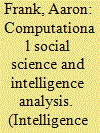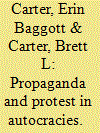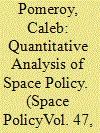|
|
|
Sort Order |
|
|
|
Items / Page
|
|
|
|
|
|
|
| Srl | Item |
| 1 |
ID:
153077


|
|
|
|
|
| Summary/Abstract |
Computational Social Science (CSS) is an emerging, interdisciplinary approach to the study of social systems. This chapter provides readers with an introduction to CSS, and discusses why examining the behavior of individuals and groups in social systems from an algorithmic perspective provides new and exciting analytic opportunities for the Intelligence Community and analytic tradecraft. Through the use of artificial societies, commonly referred to as Agent-Based Models (ABMs), intelligence analysts can improve strategic intelligence assessments by capitalizing on the scientific and tradecraft merits of computational simulation.
|
|
|
|
|
|
|
|
|
|
|
|
|
|
|
|
| 2 |
ID:
178666


|
|
|
|
|
| Summary/Abstract |
Does propaganda reduce the rate of popular protest in autocracies? To answer this question, we draw on an original dataset of state-run newspapers from thirty countries, encompassing six languages and over four million articles. We find that propaganda diminishes the rate of protest, and that its effects persist over time. By increasing the level of pro-regime propaganda by one standard deviation, autocrats have reduced the odds of protest the following day by 15%. The half-life of this effect is between five and ten days, and very little of the initial effect persists after one month. This temporal persistence is remarkably consistent with campaign advertisements in democracies.
|
|
|
|
|
|
|
|
|
|
|
|
|
|
|
|
| 3 |
ID:
169329


|
|
|
|
|
| Summary/Abstract |
Decades of space policy research have yielded an eclectic, multidisciplinary research agenda replete with findings that are relevant for theory and policy. Absent from the literature, however, is a systematic review and discussion of the data and research methods used to ascertain these findings. This is important for research progress because data and method choice have implications for the validity of the findings, potential contributions to theory, and efficacy of suggested policy prescriptions. Motivated by advances in computational social science, this article reviews the quantitative space policy literature and finds scope for further development with respect to data sources, method selection, and substantive topics of inquiry. Given these findings, two methodological areas are introduced, namely text and network analysis, and their utility is illustrated through an extension of a previous public opinion study, as well as a novel application regarding state support for international space law. This review might be relevant to scholars and practitioners interested in the empirical study of space policy.
|
|
|
|
|
|
|
|
|
|
|
|
|
|
|
|
| 4 |
ID:
173421


|
|
|
|
|
| Summary/Abstract |
The strategic culture approach has been suffering from a prolonged theoretical stalemate, despite a surge in case studies, which culminated in the Johnston-Gray debate and subsequent schism. The present paper outlines a new approach designed to overcome this deadlock, and consists of three arguments. First, the three previous generations of strategic culture studies have failed to explain how strategic culture influences behaviour. Second, aligning strategic culture theory-building with discursive institutionalism offers a way to overcome this fundamental fallacy. Third, a research programme for strategic culture should draw on computational social science to enable it to present and test middle-range theories.
|
|
|
|
|
|
|
|
|
|
|
|
|
|
|
|
| 5 |
ID:
175449


|
|
|
|
|
| Summary/Abstract |
In spite of theoretical and methodological diversity, the three generations of the strategic culture literature failed to overcome the main challenge of the approach – to account for change in behavior – due to two fallacies: Conceptualizing strategic culture as homogenous on the national level and continuous on the temporal level. However, the recent emergence of fourth generation in the literature offers prospects for overcoming them. The article presents a new, falsifiable theoretical model that pursues this aim. Thus, it begins with discussion of the promise and pitfalls of the fourth generation. Next, the alignment of strategic culture with new institutionalism is explored. This is followed by an introduction of discursive institutionalism and its potential for advancing the fourth-generation theory building. Then, a new falsifiable fourth-generation discursive-institutionalist strategic culture model is presented. The concluding section discusses the operationalization of the model via network analysis using social data science methods.
|
|
|
|
|
|
|
|
|
|
|
|
|
|
|
|
|
|
|
|
|